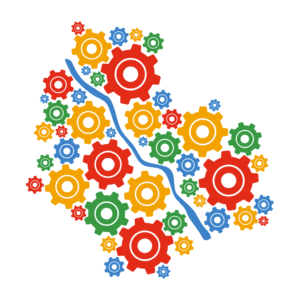Warsaw just launched the 2017 edition of participatory budgeting, but the first Polish city to implement this best practice of local democracy was Sopot, located on the Baltic Sea, in 2011. Since then, dozens of Polish cities have adopted this tool, which has been proven worldwide as a way to engage citizens in local development and improve their relationship with public administration. Since 2011 a total of PLN 318,534,957 has been spent to finance projects created by citizens and chosen by their peers. And it looks like this is only the beginning…
Once upon a time in Porto Alegre…
Participatory budgeting (PB) is a mechanism that allows citizens to decide how to allocate part of the public budget. The first implementation of this idea was developed in the 1980s by the Brazilian Workers Party. However, the real participatory process, as part of public policy, was born in the Brazilian city of Porto Alegre, the largest city and capital of the state of Rio Grande do Sul, with a population of 1.2 million, in 1989.
By allowing citizens to influence – at least partly – what public money will be spent, participatory budgeting increases trust in local authorities, as well as promotes knowledge and awareness of city administrations and their possibilities.
The success of Porto Alegre inspired other municipalities in Brazil to implement this process. By 2001, over 100 cities in the country had made participatory budget part of their budgeting decision-making process.
Furthermore, as a proven good practice, the concept spread around the world. As of 2015, over 1,500 participatory budget programmes have been implemented on five continents. While the democratic philosophy of participatory budget is a common foundation, institutional variations abound.
 Polish participatory budget
Polish participatory budget
The Polish version of participatory budget, locally called “Budzet partycypacyjny” or “budzet obywatelski” (transl.: citizen’s budget), was born in the coastal city of Sopot in 2011.
The Administration and Digitalisation Ministry has long supported and encouraged municipalities to implement this now well-functioning system around the world as a good incentive to involve citizens in their city’s administration. The ministry launched a dedicated portal to gather information about the cities and budgets opened to popular vote.
In the Polish version of the system, cities declare the percentage of the budget they want to open to popular vote. It is usually between 0.5 and 2% of the total budget available for a given city; the largest percentage of 3.96% exists in the southern city of Kęty (19,000 inhabitants). Then citizens are invited to present projects for the community they’d like the city to finance and implement. After the administration verifies the reliability of the projects, all inhabitants have a short period – 10 days in Warsaw, for example – to vote for the project they’d like to see implemented. The results of the vote are released and the selected projects carried out.
Still a learning curve
Over the years, cities tend to increase the amount they’re prepared to open for public vote. Whereas Warsaw dedicated 21 million PLN in 2015 to participatory budgeting, that figure increased to 51 million in 2016 and will reach 61 million in 2017. One might think that large cities are more willing to take part in the participatory process and devote a larger part of their budgets to participatory budget, but in Poland smaller cities were quick to join the movement, even with a very limited amount open to popular vote, such as the eastern town of Hajnówka (21,500 inhabitants) that allotted PLN 120,000.
Quite unsurprisingly, the larger the city, the smaller the participation in the vote. But some cities boast of participation that far outshine the turnout in a regular election. For example, 51% of the inhabitants of the western city of Gorzów Wielkopolski took part in the participatory budgeting vote in 2015, whereas the first large city in the ranking of participatory budget participation was Wroclaw, where 30% of inhabitants voted. Farther down the ranking is Sopot with 15.4%, Warsaw with 12.4% and Krakow with 11.4%.
The happy-not-so-few
In contrast to national or local elections, which show very poor turn out, voting with respect to participatory budgeting receives a great deal more interest from citizens, both in terms of the number of voters and projects submitted.
During the very first edition in Warsaw, citizens submitted as many as 2,200 projects – 1,390 of which were approved by the administration for popular vote; 336 were chosen by inhabitants of the 18 districts.
This year, 770 projects have been accepted by the city administration and elected by inhabitants.
Something for everyone
Generally, every district of a city takes part in participatory budgeting and the nature of projects varies widely so every voter can find a project of personal interest. Whether it is a set of new books for the local library, additional benches – or litter bins – on a city square, better street lights so pedestrians feel safer, modernisation of a playground or the construction of a bike lane… there are as many projects as there are needs among different groups within society.
In any case, the whole process is, of course, totally transparent and documentation is available on the city’s website at any time and during every step of the process. That is, of course, part of the philosophy.
2017 edition: ready, steady, go… Warsaw!
 Each city has its own calendar to organise the participatory budget process. Sopot just officially announced the results of voting for this year, whereas Varsovians usually vote in late June.
Each city has its own calendar to organise the participatory budget process. Sopot just officially announced the results of voting for this year, whereas Varsovians usually vote in late June.
The capital city was the first in the country to launch the 2017 edition of participatory budget during public presentations organised in every district of the city on the same day: 6 October. Project authors will be able to submit their initiatives from 1 December 2016 to 23 January 2017. In the course of project verification carried out by the administration, public discussions will take place between 1 March and 18 March. Finally, Varsovians will be able to choose the projects they want to support between 14 June and 30 June 2017 – with results to be released by 14 July 2017.
The good news is that foreigners are welcome to take part in the vote – even if you don’t have the Polish password to official public life, the so-called PESEL (personal identification number).